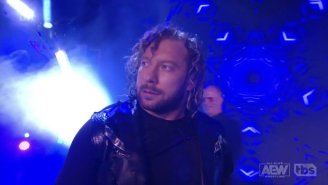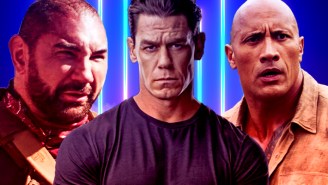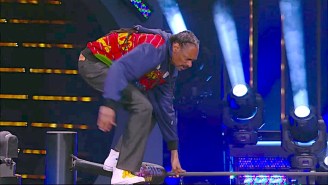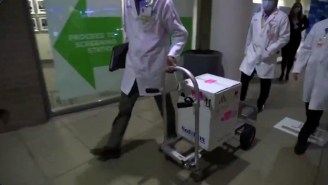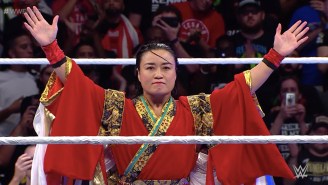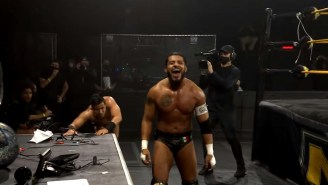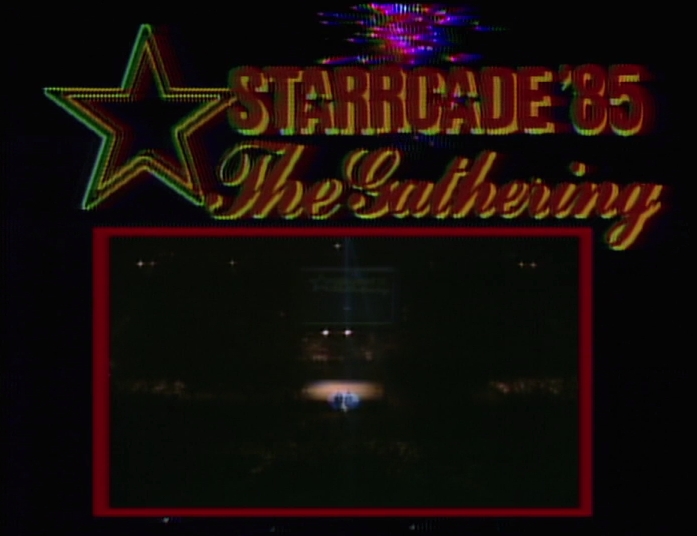
It’s not what it used to be.
That was our first reaction when WWE announced they’d be bringing back the branding for World Championship Wrestling’s WrestleMania, Starrcade, 17 years after the last one. “It’s not even a pay-per-view.” They were taking WCW’s biggest show and using it to re-brand a Smackdown house show at the Greensboro Coliseum. Halloween Havoc shirts were showing up on WWE Shop, with the late-era logos. NXT was bringing back War Games and changing all the rules. WCW was “back” in a vague, broad “thing you remember” marketing stroke. It didn’t matter. It’s like buying a Nirvana shirt from Target.
As I’ve written and spoken about a lot, I grew up in the early 80s in southern Virginia and northern North Carolina, the Mesopotamia of Mid-Atlantic territories. The fertile crescent of southern, but not Texan, pro wrestling. Horsemen country. As I wrote about in my Dusty Rhodes eulogy,
When I describe my first moments in wrestling — I’ve been going to shows since I was in the womb, but these are the ones where I’m a cognizant person with memories or whatever — I sound like Bob Costas on Ken Burns’ Baseball. You know; the green of the grass, the crack of the bat, the smell of roasted peanuts wafting through the air. My version is a white square off in the distance, lit bright white and surrounded by darkness. The sticky, wet floors of the Greensboro Coliseum. A cigar smell I’m probably imagining. The Italian Stallion was in the ring, I think, but Dusty Rhodes was the reason we were there. He was the reason the show existed, and he was the reason my dad wasn’t paying attention and my mom had to guide me by the wrist through a dark, loud arena. When I remember it in my head, the view never changes.
It’s also my job — as is the job of pretty much every WWE fan on the Internet — to assume the worst and figure out what’s wrong with the situation. Pro wrestling used to be based on the idea of “good” vs. “evil,” with towering, heroic Americans bodyslamming evil foreigners and arrogant rich people and fat guys. In the ’90s the veil was pulled back, and the stories became about complex but somehow still overly simplistic people with real names (or at best, nicknames) getting into exaggeratedly violent or sexual or Machiavellian schemes. Higher powers, that kind of thing. We lost track of good versus evil and were conditioned to understand that everyone’s a little good and a little evil, so all the heroes died or went bad. We learned to expect the worst, even from the people we like, so that the good felt special. Like fearing your favorite team’s loss until that final out in the last game of the World Series. Being afraid that Tom Brady’s gonna come back and win the Super Bowl with only a minute left, whether he does or not, because we’re used to that being how life works. Why should we win? Everybody’s bad.
I can’t remember my true first images or opinions about pro wrestling and sports-entertainment because they’ve been with me since before I was born. My mom went to shows in Greensboro while I was in the womb. My dad had kayfabe destroyed for him as a teen because he saw the Andersons after a show eating ice cream with the guys they’d just wrestled. This nonsense was bred into me. I got it honest.
What I do remember, though, and what I’ve never really written about before, is the moment I realized this fandom was going to be a part of me forever. I was little. The trip to Starrcade ’85 doesn’t register, really. Magnum T.A. vs. Tully Blanchard in an I Quit match in a steel cage is the greatest North American pro wrestling match ever, but I mostly remember wanting my parents to buy me a program. I didn’t really develop an appreciation for what happened on the show until I watched it over and over on VHS tape — because I’m ancient — but I remember what happened when we were home. I remember my mom and dad breathlessly telling my aunt about what’d happened. I remember my dad with fire in his eyes retelling the story from his view in the nosebleeds … of Baby Doll throwing a wooden chair into the ring to help Tully, and it splintering, and a shard of it ending up in Tully’s eye. How he noticed that Tully said “yes” when they asked him if he quit instead of the words “I quit,” and how those weren’t really the rules, and how it was going somewhere. Tully would have an excuse. My parents were mad about this, because they loved Magnum, but they loved the idea that there’d be more of it. The moment wasn’t the point. The point was the feeling. The feeling you take home and tell people about instead of eating food or going to sleep.
“This is mine,” I thought to myself. “This is for me.”
As I grew up, Starrcade became “Thanksgiving” for me. When you’ve been a fan forever, the big events become your holidays. The Royal Rumble is winter. The new year. Possibility. WrestleMania is the spring, when things come alive. SummerSlam happens at the very end of summer, during the dog days, when everything feels tired and sweaty. Starrcade came at the end of the year, and was about the wrestling promotion I liked the most, so it felt like the end of the wrestling year. More than WrestleMania. WrestleMania’s always felt more like an attempted beginning than a satisfying end. Starrcade said to me, “this is it. This is when the bad guy gets his comeuppance. When Tully gets stabbed in the eye. When Dusty proves he can pin Flair.” There’s always more, which is why you’re excited about it, but the year ends at Starrcade. Then you have Christmas, and then you start over.
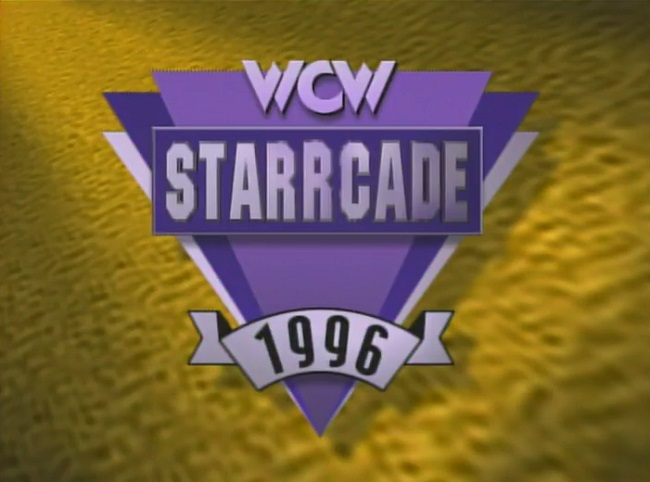
I’m not sure when the true changeover happened from me being a little kid who wants a program and some cotton candy more than anything, and being a teen with an internet connection who wanted to know what would happen, and why, and what was happening backstage, and why. Understanding the thing I love took over loving it. That happens a lot. You fall in love with someone, you get to know them, and then understanding them becomes more important than loving them. And then the year ends, and you start over.
It’s how we interact with our parents. We start off blinding loving them, because it’s what we’re supposed to do. It’s instinct. How we feel. It’s etched into our DNA. “Love these people, they’re taking care of you.” It doesn’t always work like that, but luckily, it did for me. My parents were poor and had no idea what to do with me, but they were there, and they were trying very hard to take something they loved — wrestling — and give it to me. I was never introduced to it. I just loved it, because it was a part of me. A part of us. Starrcade at the Greensboro Coliseum. Good vs. evil.
At some point you become a sentient human being and start growing apart. For some people it happens early. For me, my relationship with my parents paralleled my relationship with wrestling, hold for hold. I started off blindly loving them. I spent too much time with them, so I started wondering about the how and the why, and figuring out how to be my own person. Wondering how I fit into the world. I got on the Internet and shouted, “hey, I’m this thing,” to the void. The void shouted back, “some of us are that thing, too!”
As I changed from one thing to another, pro wrestling was the great connectivity between us. We’d still go to shows in Greensboro when they came through, which became less and less often. We moved from Danville to Lynchburg, about an hour north, and shows became Roanoke instead of Greensboro. Wrestling changed, the NWA became WCW, and we saw them even less. We’d get a Fall Brawl and a War Games, or we’d get a throwaway house show. Starrcade grew up and spent more time in Chicago, Nashville, St. Louis. WCW became more about Atlanta than North Carolina. My parents, who’d taken me to shows at the Greensboro Coliseum in the most nosebleed of nosebleeds, with our backs against the back wall of the building, took me to the shows they could … with my friends, who’d I’d sit with instead of them. It’s what you do. You grow up. Sideways, whatever.
By the time the Monday Night Wars happened, I was only really talking to my parents about wrestling to catch them up. They watched Nitro and flipped over to see Steve Austin on Raw, but they were growing out of it. Now. Wrestling wasn’t really “for” them anymore. Hell, it wasn’t really for ME anymore, but I was sticking around to figure it out. I found new things to love that my parents didn’t understand, like the cruiserweights — “I just want to see people beat the crap out of each other,” my dad would mention — or the more scandalous material, like ECW. My dad would find someone to like, like the Dudley Boyz, but my mom mostly stopped paying attention. Without my mom disinterested and me going off on my own, my dad stopped having someone to talk to about wrestling. It dwindled, and it dwindled, and it died.
Then WCW went out of business. It was done. Starrcade became a kind of time capsule, a thing you’d buy a WWE DVD for if they put Magnum and Tully in the cage on it, because that match was good, you remember. I remember Sting vs. Flair! I remember Vader vs. Flair! Oh, those are on this? I might pick it up for those, but I don’t really care about the rest of it. I can hear my dad saying that, and I can still see me and him hitting up separate Best Buys in separate states to buy the same thing, for the same reason.
Decades passed. My parents became people I’d talk to on the phone every few weeks, maybe monthly. I’d try to talk to my mom more than my dad. It’s what happens. As they got farther and farther from WWE and what pro wrestling had become, I fell more and more into it. My tastes from the ’90s crystallized and contorted. I wasn’t really sure what I was into anymore, but this had become such a part of my life that I couldn’t let it go. In those confused emotions was born the “Best and Worst of Raw” column, where I used a fraction of my writing gig at AOL FanHouse Back Porch to work through what I liked about the shows, and what i didn’t. Those things are just as much for me to understand what I’m feeling as they are to tell you what I thought. Soon enough, and fortunately enough, those columns snowballed into an actual day job writing about pro wrestling. I found myself at the Royal Rumble in the winter, and WrestleMania in the spring, and SummerSlam in the dog days. The year would end, and I wouldn’t really have anything to talk about with my mom and dad. “Remember Dusty? I wish he was still around.” “How’s Ric Flair doing? He still at it?”
It would just come up, and pass. It wasn’t what it used to be.
https://www.instagram.com/p/Bb8AyRKA33z/?taken-by=mrbrandonstroud
When WWE announced they were branding this show as “Starrcade,” my first reaction was a weird, aimless anger at the passing of time. “That word doesn’t mean what they think it means!” They own a thing and want to use it, but it’s not what I would do, because I wasn’t a businessman when it was happening. I wasn’t a wrestler. I was a kid. I was there with my parents. What do these businessmen and wrestlers know? THIS IS MY LIFE. A lot of yelling “rabble rabble” at my computer screen, like people who’ve lived with this their entire lives tend to do. Conditioned to expect the worst.
In an attempt to salvage that feeling, I decided to fly in from far away, back to Virginia, to take my parents to Starrcade. It wasn’t what it used to be, but neither were we. It wasn’t “real,” but it would be fun. The trip there was very much my parents, with my dad asking me if I remember Dusty and if Ric Flair is still wrestling, and my mom staring out of the passenger side window, not paying attention. It was the first time I’d ridden in the backseat with my parents in the front in a long time. Even when we were at the arena, I was running around the lobby, navigating a sea of Balor Club t-shirts and anti-John Cena signage to find the box office, it felt like an act. “This isn’t really the Greensboro Coliseum, they’ve added to it since we were here. Most of these kids weren’t alive when Starrcade was around. Oh, there go the woos. People are wooing.”
The truth of the matter started to sink in when we were in our seats; the jaded wrestling writer who “probably doesn’t like it anymore” and his parents, who are waiting for someone to show up in cowboy boots. We were old now. All of us. And then I looked up and saw where the U.S. flag is hung in the Coliseum. That got to me. The only view I’d ever really gotten it from, since we grew up poor Virginia wrestling fans, was from the upper deck. Usually behind it, to the right or left. I remember, because you used to have to put your hand over your heart and listen to a cassette recording of our national anthem before shows started. And now 30 years later here I was, on the floor, shoulder-to-shoulder with my parents, cranking my neck all the way up to see it hanging from the ceiling, dead center.
We’d come a long way.
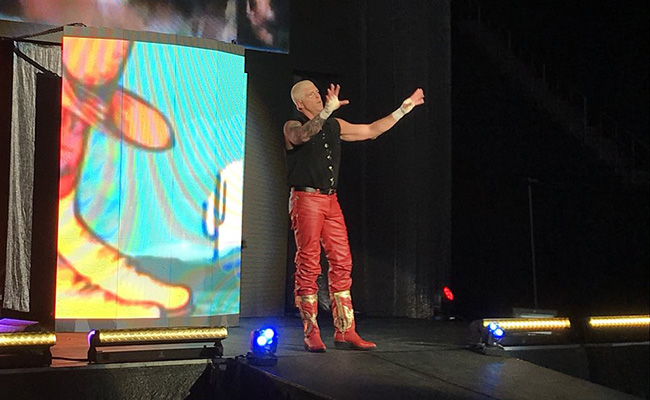
While the event itself was fun — it was a house show, sure, but WWE house shows are usually a lot of fun, especially if they aren’t taking it too seriously — what I remember most is how it connected the past to the future. I wasn’t expecting that. Arn Anderson showed up, like he used to, and hit a spinebuster, like he used to. I got to explain Bobby Roode and ‘Glorious” to my parents. Ricky and Robert of the Rock ‘n’ Roll Express showed up, my favorite tag team from the ’80s, and danced with the Hardy Boyz, my favorite tag team from the ’90s. I got to explain the New Day to my parents. Ric Flair showed up, his first appearance since almost losing his life, and I got to explain Charlotte to my parents, and David, and Reid.
Something took over for me during that show. Something about fathers and sons. Dusty Rhodes wasn’t there, but Dustin Rhodes was. Not Goldust. Dustin Rhodes. He was more the original American Nightmare than the “Natural,” but he was using that theme and those graphics, and he cut a promo after his match about how much he wished his dad was there. I could see my dad’s eyes getting wet in the corners. Dusty was his favorite. My life was connecting in spots I never expected.
Throughout the show, we saw the motif of parents and children. Ric Flair was there, but his time has passed. His daughter was defending a championship in a steel cage, something he used to do, and he was so proud of her. She’s great, and sometimes we forget what an anomaly she is, because we’re used to the Flairs and the figure-fours and the wooing. Before Matt Hardy danced with the Rock ‘n’ Roll Express and the New Day, he brought his son, King Maxel, out onto the stage. During their segment, Matt’s wife Reby stood a few rows behind my parents and I with Maxel in her arms, watching. Dusty was there for Dustin, even if we couldn’t see him. And like always, my mom and dad were there with me. Because without them, I wouldn’t be this. Without Starrcade, they might not be them. And then I might not be me. Dustin might not be Dustin, Charlotte might not be Charlotte, Maxel might not be Maxel.
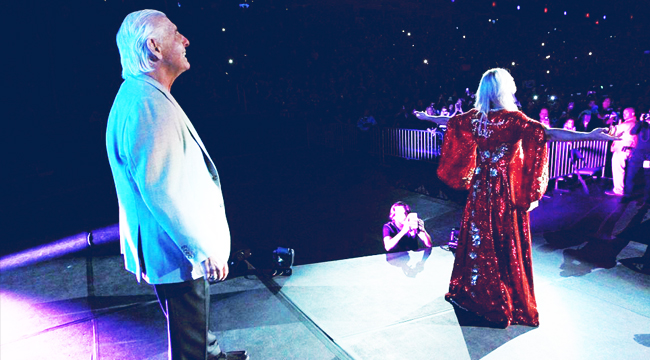
I don’t remember a lot about what actually happened inside the ring on the show. I remember that the Natural vs. Dash Wilder was way too short, and I remember my parents getting frustrated that Jinder Mahal’s only move seemed to be “outside interference,” and that Charlotte was supposed to be a bad-ass but spent the entire match getting beaten up by Natalya. I don’t think it mattered … because the thing I do remember is that drive back to my parents’ house, cramped in the backseat trying to sleep before an early AM flight home, with my mom and dad breathlessly laughing about Ricky Morton’s bad dancing and how good it was to be there again, with those people. Those fantastic, unattainable people they spent their lives wishing they could be, only to find out they ended up just like them. Like a son to a father. Cat’s in the inside cradle, or whatever.
A few months removed, I don’t remember the misguided animosity toward a new thing having the same name as an old thing. I don’t think much about how the flyer misspelled a few wrestler names, or how Charlotte didn’t do much in her match, or anything else. I remember it was my mom and dad being forced to remember what it was like to be in their 20s, fired-up and pissed off about wrestling, and how it was the venue, and the company, and the name that got them there. I wouldn’t have been there with the people who gave me life if Michael Hayes hadn’t said, “hey, what if we call this house show Starrcade?”
And at the end of the day, I think that’s what’s special about WWE, and pro wrestling. It’s not what happens that matters, really. Even if we scream and complain about it every day. It’s the drive home. “Smiles on people’s faces” is the talking point, but I couldn’t see my mom’s smile, or my dad’s smile. I could hear them, though. And when I’m their age, I’ll remember Starrcade in broad strokes and impressions, but I’ll remember ever second of that cramped backseat, and their voices, and the smell of the arena, and that flag.
We’d come a long way, and we’re still where we started.
https://www.instagram.com/p/Bb8OROUgQFh/?taken-by=mrbrandonstroud
This winter, if WWE announces, “we’re returning to Greensboro in October, and we decided we’re gonna call it Halloween Havoc, and it’s actually just a 205 Live tour stop with some custom signage,” I’ll post an angry link to the news in Slack and call it, and write about how ridiculous and frustrating it is that Halloween Havoc’s not really Halloween Havoc. I’ll go into our comments section to see people who feel the same way, and scroll through all the jokes on Twitter.
And then I’ll probably call my mom and dad and see if they wanna go to Halloween Havoc.

